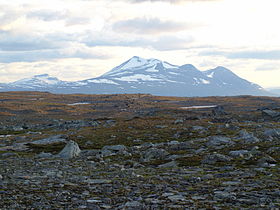Scandinavian mountains
| Scandinavian Mountains | |
|---|---|
| Skanderna, Fjällen, Kjølen, Köli, Skandit | |

Mount Áhkká in Stora Sjöfallet National Park, Northern Sweden
|
|
| Highest point | |
| Peak | Galdhøpiggen (Lom) |
| Elevation | 2,469 m (8,100 ft) |
| Coordinates | 61°38′11″N 08°18′45″E / 61.63639°N 8.31250°E |
| Dimensions | |
| Length | 1,700 km (1,100 mi) |
| Width | 320 km (200 mi) |
| Geography | |
| Countries | Norway, Sweden and Finland |
| Range coordinates | 65°N 14°E / 65°N 14°ECoordinates: 65°N 14°E / 65°N 14°E |
The Scandinavian Mountains or the Scandes is a mountain range that runs through the Scandinavian Peninsula. The Scandinavian Mountains are often erroneously thought to be equivalent to the Scandinavian Caledonides. The western sides of the mountains drop precipitously into the North Sea and Norwegian Sea, forming the fjords of Norway, whereas to the northeast they gradually curve towards Finland. To the north they form the border between Norway and Sweden, still reaching 2,000 m high (6,600 ft) at the Arctic Circle. The mountain range just touches northwesternmost Finland, but are scarcely more than hills at their northernmost extension at the North Cape (Nordkapp).
The mountains are not very high, but are very steep at places; Galdhøpiggen in southern Norway is the highest peak, at 2,469 metres (8,100 ft), Kebnekaise has the highest peak on the Swedish side, at 2,104 m (6,903 ft), whereas Halti is the highest peak in Finland, at 1,324 m (4,344 ft).
The combination of a northerly location and moisture from the North Atlantic Ocean has caused the formation of many ice fields and glaciers. Temperature drops with increasing altitude, and permafrost becomes common from about 1,500 meters above sea level on their western slope in Southern Norway and at about 1,200 meter AMSL on their eastern slope in Southern Norway near the border with Sweden. In Northern Norway, permafrost becomes common from about 800 to 900 meters AMSL on the western slope and some 200- to 300-meters-lower on the eastern slope.
The Scandinavian Montane Birch forest and grasslands terrestrial ecoregion is closely associated with the mountain range.
...
Wikipedia

